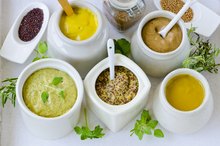Manuka Honey Side Effects
Manuka honey is not only a sweetener you can add to your tea or hot cereal, but it's also said to have medicinal properties. However, the sweet honey may not make a good choice for everyone. Side effects may include allergic reaction, elevated blood sugar and weight gain. Consult your doctor if you're experiencing a reaction after consuming manuka honey.
Manuka Nutrition
Like other sweeteners and other types of honey, manuka honey is a concentrated source of calories, carbs and sugar. A 1-tablespoon serving contains 60 calories, 18 grams of carbohydrates and 16 grams of sugar, which is very similar to the nutritional composition of a generic honey. The honey is fat- and sodium-free and is not a significant source of any vitamin or mineral. However, it is rich in phytochemicals, including flavonoids and phenolic acids, nutrients that may benefit your health.
- Like other sweeteners and other types of honey, manuka honey is a concentrated source of calories, carbs and sugar.
- A 1-tablespoon serving contains 60 calories, 18 grams of carbohydrates and 16 grams of sugar, which is very similar to the nutritional composition of a generic honey.
Allergic Reaction
Stevia Powder Vs. Stevia Blend
Learn More
Although it's not as common as a soy or wheat allergy, one potential side effect of manuka honey is an allergic reaction. The reaction may be due to the pollen or the bee venom. Symptoms of an allergic reaction to the honey might include the development of a rash or hives, wheezing or coughing, difficulty swallowing or stomach upset such as nausea and vomiting. Seek medical attention if you experience any of these reactions. Only a doctor can diagnose a food allergy.
- Although it's not as common as a soy or wheat allergy, one potential side effect of manuka honey is an allergic reaction.
- Seek medical attention if you experience any of these reactions.
Blood Sugar Increase
As a source of carbs and sugar, manuka honey may affect your blood sugar levels. However, it's important to note that honey may not impact blood sugar as much as regular sugar. A 2014 study published in "The Journal of the Pakistan Medical Association" found that honey does not cause a dramatic rise in blood sugar and, in small amounts, may serve as an alternative sugar substitute for people with Type 2 diabetes.
Weight Gain
Nutrition of Creamed Honey
Learn More
You may be taking manuka honey as a supplement, but it's still a source of calories and should be counted toward your overall intake. If you consume 1 tablespoon of manuka honey daily without making any other changes to your diet or exercise routine, it could lead to a 6-pound weight gain over the course of a year. Using the honey in place of other sweeteners, such as the sugar in your tea or coffee, may help prevent the weight gain from the added calories.
Related Articles
References
- Memorial Sloan Kettering Cancer Center: Manuka Honey
- Swanson Vitamins: Raw Manuka Honey
- Linus Pauling Institute: Phytochemicals
- Allergy: Allergy to Honey - Relation to Pollen and Honey Bee Allergy
- American College of Allergy, Asthma and Immunology: Types of Allergies - Food Allergy
- The Journal of the Pakistan Medical Association: Comparison of Glycaemic Response to Honey and Glucose in Type 2 Diabetes
- FamilyDoctor.org: What It Takes to Lose Weight
- U.S. Department of Agriculture. Honey. FoodData Central. 2019.
- Cianciosi D, Forbes-Hernández TY, Afrin S, et al. Phenolic Compounds in Honey and Their Associated Health Benefits: A Review. Molecules. 2018;23(9):2322. doi:10.3390/molecules23092322
- Oduwole O, Udoh EE, Oyo-Ita A, Meremikwu MM. Honey for acute cough in children. Cochrane Database Syst Rev. 2018;4:CD007094. doi:10.1002/14651858.CD007094.pub5
- Pasupuleti VR, Sammugam L, Ramesh N, Gan SH. Honey, Propolis, and Royal Jelly: A Comprehensive Review of Their Biological Actions and Health Benefits. Oxid Med Cell Longev. 2017;2017:1259510. doi:10.1155/2017/1259510
- Aguiar R, Duarte FC, Mendes A, Bartolomé B, Barbosa MP. Anaphylaxis caused by honey: A case report. Asia Pac Allergy. 2017;7(1):48-50. doi:10.5415/apallergy.2017.7.1.48
- American Academy of Pediatrics. Botulism. HealthyChildren.org. Updated November 19, 2018.
- National Honey Board. Honey Varietals. 2020.
Writer Bio
Jill Corleone is a registered dietitian and health coach who has been writing and lecturing on diet and health for more than 15 years. Her work has been featured on the Huffington Post, Diabetes Self-Management and in the book "Noninvasive Mechanical Ventilation," edited by John R. Bach, M.D. Corleone holds a Bachelor of Science in nutrition.









